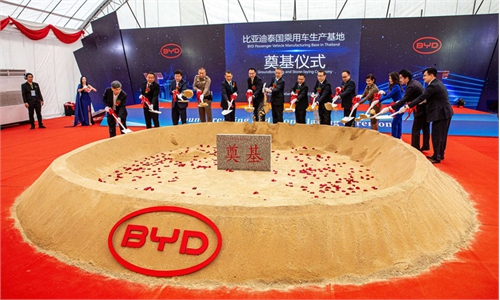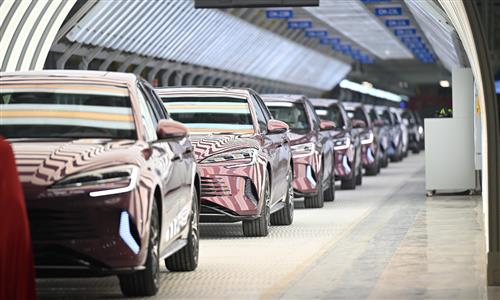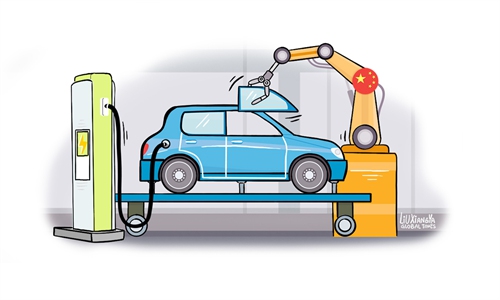
Illustration: Chen Xia/Global Times
China has reportedly overtaken Japan as the world's largest auto exporter, but there are still thorny challenges ahead. A key question is how to hedge against increasing import barriers, tangible or intangible, from the West. Amid fierce competition, can China maintain its position as the world's leading auto exporter for a long time?In 2023, China's exports of passenger cars reached 3.83 million units, an increase of 62 percent year-on-year, data from the China Passenger Car Association (CPCA) showed on Tuesday. Cui Dongshu, secretary-general of the CPCA, said China has become the world's top auto exporter, not only in terms of quantity but also in terms of value, The Paper reported.
It is not much of a surprise that China, already the largest new-energy vehicle (NEV) market, takes the crown as the world's largest auto exporter. China has many advantages that the West does not, especially in the field of technology.
In 2021, Chinese NEV makers were granted more than 30,000 patents, accounting for about 70 percent of the global total. When it comes to core-technology innovation, including dedicated electric vehicle (EV) platforms, power batteries and third-generation semiconductors, China has surpassed the US and Europe and become a world leader in the EV industry.
In just the three years from 2019 to 2022, the share of Chinese-made EVs in the European market reportedly surged from a negligible 0.5 percent to 14.7 percent, media reported. The main reason for this was China's advanced manufacturing capacity, cost effectiveness and technological innovation. These advantages won't change in the short term, which means that although global competition is becoming increasingly fierce, and some Western politicians with zero-sum thinking may try to set obstacles for Chinese companies, there is a high possibility that China surpassing Japan to become the world's largest auto exporter will become an irreversible process.
Of course, the internationalization of China's auto supply chain will not be a smooth process due to complex factors. In September, the European Commission announced to launch an anti-subsidy inquiry into low-cost electric cars coming from China. In December, the Wall Street Journal reported that the Biden administration in the US was discussing raising tariffs on some Chinese goods, including EVs. Many expect that China's EV exports will face thorny challenges in the future, especially in Western countries, where they may encounter increasing trade protectionism.
Among the top 10 destination countries for China's auto exports, many are developed nations, which have mature markets, high popularity of EVs and relatively complete infrastructure networks for charging stations.
Chinese EV companies must now explore new markets, especially immature ones in developing countries, which have great growth potential.
China has enormous potential for cooperation with other developing countries in the EV industry chain. If Chinese EV companies can help these developing countries promote industrialization and green transformation, then the risks of Chinese EVs facing protectionism in these countries will be greatly reduced. A win-win result can be achieved.
EVs are widely accepted in major markets like China, US and Europe, but their adoption in developing countries has been slow. In a study of 20 developing countries across Africa, Asia, the Caribbean, Oceana, Europe and South America, the report Economics of Electric Vehicles for Passenger Transportation found that more than half would benefit economically by adopting electric mobility. This adds to the evidence that cooperation has broad prospects.
Chinese EVs are generally cheaper than their Western counterparts, making them attractive for consumers in developing countries. Hopefully more developing countries can see the opportunities for the development of China's EV industry and strengthen cooperation with China.
The author is a reporter with the Global Times. bizopinion@globaltimes.com.cn



